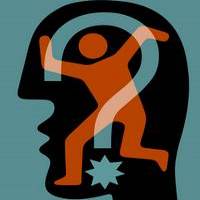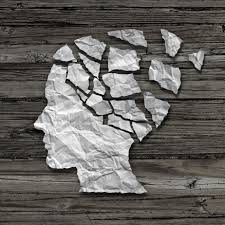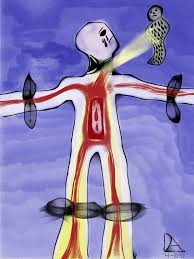When ‘depression’ fills the knowledge gap and trauma loses its voice
May 25th, 2018 | Published in Health & Mental Health
Have you ever had the experience of going to a doctor, feeling unwell, only to be told there seems to be nothing wrong, but “I think you might be depressed”? Were you satisfied with that response? Did you question it? What sort of answers did you get?
Have you ever (as I have) really wanted a different kind of conversation – about the long term effects of trauma on the body, and whether that might be important in partly understanding what’s going on for you physically? How did that work out for you? Not great, was my experience!
term effects of trauma on the body, and whether that might be important in partly understanding what’s going on for you physically? How did that work out for you? Not great, was my experience!
In this post, I reflect on the knowledge gap that can arise in medicine when symptoms don’t have a clear explanation. I argue for the gap to be opened up, rather than closed down prematurely with convenient labels (like depression, anxiety, and stress) that can cause harm.
Wastebasket of ‘medically unexplained symptoms’
It’s not unusual, it seems, for patients to be told their medically unexplained symptoms are psychosomatic (or some other variation of ‘in your head’). Particularly when the condition is difficult to diagnose, and particularly when symptoms (some of which might overlap with mental health conditions) are part of a syndrome such as chronic fatigue, irritable bowel, fibromyalgia, chronic pain, or endometriosis.
The symptoms of such conditions can, of course, be toxic to mental health, as Franklin Warsh notes in relation to chronic pain. But, that’s not the same as short-circuiting further investigation by transposing unexplained symptoms into a mental health framework, and then treating them accordingly, potentially with psychotropic drugs.
Filling the knowledge gap can cause harm and women are particularly at risk
Both men and women can be dismissed and misdiagnosed, although the chances of unexplained symptoms being interpreted in mental health terms are higher for women, as Maya Dusenbery documents in Doing Harm. Up to a third of patients in primary care, and up to two-thirds in specialty clinics, she notes, have ‘medically unexplained symptoms.’ About 70 percent of these are women.
When she started asking questions, Dusenbery says: “It seemed like nearly every one who’d had  a serious health problem had an experience to share.” There was the friend whose abdominal pain, from an infection, was diagnosed as ‘stress’; the friend experiencing dizziness, wooziness, ringing in her ears, and floaters in her eyes who was referred to a therapist for depression, but was subsequently found to have West Nile virus; the friend who was told her stabbing chest pain, from pericarditis, was likely just anxiety. And on and on.
a serious health problem had an experience to share.” There was the friend whose abdominal pain, from an infection, was diagnosed as ‘stress’; the friend experiencing dizziness, wooziness, ringing in her ears, and floaters in her eyes who was referred to a therapist for depression, but was subsequently found to have West Nile virus; the friend who was told her stabbing chest pain, from pericarditis, was likely just anxiety. And on and on.
Nearly 200 women wrote to Dusenbery about their experiences, and she interviewed many of them. She also reviewed the scholarly research.
“Women’s reports of their symptoms are too often disbelieved,” she writes. “For centuries, ‘hysteria’ was a label for pretty much any mysterious symptom in women, and theories that tied it to a ‘wandering womb’ or women’s sensitive nerves flourished.”
“The labels doctors apply, often with surprising confidence, to symptoms they can’t explain have varied over time, from Freud’s diagnosis of hysteria, to Briquet’s syndrome, somatisation, somatoform disorder, and conversion disorder. Perhaps most common in the current medical literature is the term ‘medically unexplained symptoms’ ― a phrase that needn’t necessarily imply a psychogenic origin but, in practice, often does.”
And, the problem self-perpetuates, as doctors rarely get feedback that the patient they sent home with a prescription for antidepressants was eventually correctly diagnosed by another doctor.
 Wouldn’t it be simpler, I find myself wondering, to admit not knowing? To acknowledge that medically unexplained symptoms might be just that? Symptoms that need an explanation but lack an immediately obvious one? Rather than muddying the waters, and possibly the internal systems of patients, with inappropriate diagnoses and unhelpful antidepressants and anxiolytics?
Wouldn’t it be simpler, I find myself wondering, to admit not knowing? To acknowledge that medically unexplained symptoms might be just that? Symptoms that need an explanation but lack an immediately obvious one? Rather than muddying the waters, and possibly the internal systems of patients, with inappropriate diagnoses and unhelpful antidepressants and anxiolytics?
“No,” I’m sometimes told when I raise such questions. “You’re ignoring the expectations patients have about ‘answers’ and the pressure practitioners feel to provide them.”
Maybe. But, then, maybe those expectations need challenging. Maybe we need to live more comfortably with the reality that bodies, minds, and their intersection, are complex, and that ‘answers’ are sometimes not the answer. Particularly when such ‘answers’ are poorly based and may give rise to interventions that can cause harm.
Maya Dusenbery’s experience
Dusenbery’s book was inspired by her own experience. She had a bad bout of flu, following which her knuckles, elbows, toes, ankles and knees started to ache. She eventually went to a rheumatologist and was diagnosed with rheumatoid arthritis.
She was relatively lucky, she says, to get a diagnosis within several months. “According to the American Autoimmune Related Diseases Association, patients with autoimmune diseases (75 percent of whom are women) see an average of four doctors over four years before they receive the correct diagnosis, and nearly half report being labelled chronic complainers during their search.”
A substantial proportion of those “chronic complainers” would no doubt have received ‘diagnoses’ of depression, anxiety, or both.
Dusenbery says she’s grateful that her early diagnosis meant her condition is now well-managed. The precariousness of the process, however, made her think about how things could have turned out so much worse. She became curious about other people’s journeys, and the frequency of misdiagnosis, particularly the use of mental health labels to paper over a knowledge gap.

‘Depression’ in palliative care
One of the most startling misdiagnoses I’ve come across occurs in a podcast by Andrew Denton. It concerns a woman in palliative care who is seen by the medical professionals as “having depression”.
Denton is interviewing Shayne, whose mother, Jan, is dying a painful death from an aggressive form of brain cancer. Jan is in hospital under terminal sedation. She’s suffering extended seizures and feels as if she has “a giant thrashing around in her body”.
Andrew Denton: “When you [Shayne] spoke to the medical staff, you said to them clearly, my Mum wants to be knocked out.”
Shayne: “Mm.”
Andrew: “Do you recall, clearly, what they said to you in response, or was it a vague sort of obfuscation?”
Shayne: “No, they actually said ‘I think your Mum might have depression’”.
Andrew: “She was within a couple of weeks of death at this point.”
Shayne: “Yes.”
Andrew: “She had a major brain tumour. Multiple brain tumours. She was clearly in pain and her body was shutting down all over the place and they said she may have depression.”
Shayne: “Yes. Yep.”
Personal experience of being labelled with ‘depression’
I’ve also had relevant experiences (although not in palliative care!) with two specialists, neither being a mental health specialist. In both cases, the ‘assessment’ (“I think you’re depressed”) was off-the-cuff and in response to my reports of weakness, breathlessness, and general un-wellness beyond what they found explainable.
In fact, the symptoms were not ‘unexplained’, although their level may have been  puzzling. I have heart disease, lung disease, and was iron deficient. The combination perhaps created effects that were greater than the sum of the parts, or greater than could be ‘explained’ by any one condition through the lens of its particular specialty.
puzzling. I have heart disease, lung disease, and was iron deficient. The combination perhaps created effects that were greater than the sum of the parts, or greater than could be ‘explained’ by any one condition through the lens of its particular specialty.
The heart condition is now stabilised with stents and medication, and an iron infusion dealt with the iron issues (at least temporarily). The lung disease is untreatable, but I’m feeling a whole lot better and much stronger. On that basis, like Maya Dusenbery, I’m one of the lucky ones.
I was also lucky enough to know enough to reject the ‘diagnosis’ of depression, and disputed it at the time.
“I thought you might disagree with that,” said one specialist. He knew I was a retired psychologist. His acknowledgment did not, however, stop him from putting his ‘diagnosis’ into a letter back to the general practitioner.
Maybe I could have done a better job of setting the record straight. I don’t know. As Dusenbery notes, “questioning a medical expert is difficult even for those patients who are highly educated and privileged. In the exam room, the doctor always has the power.”
And the patient may not be feeling up to an argument!
Opening up the knowledge gap
Although I wasn’t impressed by the default position of the specialists, I was fortunate that my general practitioner seemed refreshingly able to sit with not fully understanding what was going on for me.
 At one stage (while I was still feeling pretty dire, before the iron infusion, and before heart medication had been optimised) I was sufficiently encouraged to push the boundaries of conversation with him.
At one stage (while I was still feeling pretty dire, before the iron infusion, and before heart medication had been optimised) I was sufficiently encouraged to push the boundaries of conversation with him.
I was curious to explore any possible connection between some of my cardiac issues (rapid heartbeat, atrial fibrillation, for example), the fact that I have long been prone to an overactive startle response, and my personal history, threaded as it is with car accidents, violence, and other forms of trauma.
Could it be, I wondered, that as I’ve aged my body has, in a sense, lost the plot, behaving as if it’s constantly under threat, even when it’s not? And forgetting the unlearning and relearning I’ve done to manage overreactions to environmental triggers?
“Oh,” was the response from the general practitioner, “do you think what’s happening is psychogenic?”
“No,” I replied.
We were back to locating unexplained symptoms ‘in the head’, and cutting them off from history, whereas I was interested in a different conversation – about the legacy of trauma and the way personal history can, in effect, speak through the body.
The imprint of trauma on physical systems is an important area of scholarship, and people like Bessel van der Kolk, Judith Herman, and Babette Rothschild are among the experts. Knowledge about the effects of trauma does not, however, seem to be well integrated into mainstream medicine, and the trauma model is in tension with the dominant medical diagnostic one.
I didn’t get any sense that my general practitioner understood what I was talking about in terms of competing models, or how differently each might approach ‘unexplained symptoms’.
PTSD (post-traumatic stress disorder) comes about as close as it gets to spanning the two models. It’s pretty much core business within a trauma model, and does have some recognition within mainstream medicine. To establish it, though, requires knowledge of  a patient’s personal history, and their exposure to events such as warfare, sexual assault, other forms of personal violence, and traffic collisions. I have never been asked about any of these experiences by a general practitioner or medical specialist.
a patient’s personal history, and their exposure to events such as warfare, sexual assault, other forms of personal violence, and traffic collisions. I have never been asked about any of these experiences by a general practitioner or medical specialist.
My question about my heart issues was an attempt to enter the territory of trauma and long term physical effects. It might have reflected my ignorance about physical processes, and I would have been happy to hear that, but the response in terms of psychogenesis was a conversation-stopper.
Unexplained symptoms are contested territory
‘Unexplained symptoms’ are, I’m arguing, contested territory. They might, as in examples provided by Maya Dusenbery, and in my current case, end up being medically diagnosed and effectively treated with medical interventions. They might, alternatively, sometimes be effectively explored within a trauma model. Or, they might, in yet other cases, most effectively be considered and treated within a mental health diagnostic model. The last possibility should not, however, be the default option.
Premature judgments may do harm. It would, I believe, be in the interests of good medicine to open up discussion of ‘unexplained symptoms’ rather than filling the knowledge gap with convenient, but questionable labels.
It was possible, for me, to avoid being passed from the medical system to the mental health system when the medical practitioners encountered a knowledge gap that they attempted to fill by diagnosing depression. Others may not be so well placed, and it shouldn’t come down to the luck of the draw. That would be depressing!
Comments and stories about your own experiences are most welcome…Joan Beckwith.

Scroll down for COMMENTS.
First-time comments have to be moderated.
I try to complete that process, and respond, within 24 hours.
Do check back.
Social justice is for everyone (previously 2020socialjustice) is also on Facebook (click here)
Twitter (click here)
…………………………………………….
NOTE: If you like this post, you might also be interested in other posts in the categories of Health and Mental health and Gender; Sexuality
………………………………………………………………………………….



Thanks for all your work putting together 2020 social justice. Always a good read and so informative and referenced.
I found the book titled: Lost Connections Uncovering the real causes of depression – and the unexpected solutions by Johann Hari a good read. It appears to me that so many people are too freely given out anti-depressants by GPs.
I think this book should be recommended reading for GP training. Johann Hari wrote the book ‘Chasing the scream’, highlighting the the so called War on drugs was and still is a JOKE.
Thanks, Lorraine. The issues Johann Hari deals with could do with a lot more public discussion. They tend to bring out the establishment defensiveness, although they also resonate with many.
Competing models of mental health, as well as harm minimisation models related to substance use, have been around for a very long time, but the dominant models somehow manage to remain dominant.
Interesting to watch what’s happening with pill-testing at music festivals at the moment. It seems to be Fiona Patten’s latest focus, as a Victorian MP and leader of the Reason Party. She’s been very effective in the past in relation to legislation in the public interest (euthanasia, safe-injecting, safe access to abortion clinics) so I’m hopeful she might be able to break down the resistance on this one too.
Thanks Joan – opening up what others would close down.
Medicos sort of recognise indirectly the limitations of medical models when they label and full stop our symptoms. They sort of recognise that ‘illness’ is more than simplistic categorisations of physical/mental or even, maybe, subdivided fields of ‘speciality’. But then that’s that, too hard, next ‘patient’ please. And they take no responsibility for wholistic care. And the dangers compound. And the person and loved ones suffer more.
I believe embodied trauma is real. My current set of symptoms has a long history and is being exacerbated by workplace issues. My GP has ‘diagnosed’ ‘vicarious trauma’ arising from ongoing, unresolved workplace issues. He’s sort of, kind of on the right track I think. However, what happens next when I take the (extended) sick leave certificate to my employer? I know this will further close down the dialogue I have been trying to open up for 4 years. And I, not the workplace, will be labelled ‘sick’. If my employer knew my personal history, I would be labelled ‘already damaged, not my responsibility’. What happened to shared responsibility?
I agree that opening up exploratory, inquisitive, curious conversations about the nature of a person’s symptoms is crucial to understanding, responding, planning, and quality of life. But who has the courage and what are the ramifications? Thankfully, I am accompanied by a couple of trusted people with such courage, political savvy, common sense, and caution. No fudging there.
The way you put it, JR, makes me think it must be a pretty unsatisfactory situation for medical practitioners, as well as for their patients (and their patients’ familites). If doctors recognise, or even “sort of recognise” the oversimplifications that occur, it must be frustrating to have to let so much fall into the gaps.
You very reasonably ask “What happened to shared responsibility?” But, I wonder when (if ever) there has been a system of care (and, even more basically, problem analysis) that has attempted any kind of parsing of the person, their problematic context (workplace in your case), and the intersection. Way too often, in my experience, the person is problematised and the context remains unchallenged and unchanged.
The only way I’ve found of trying to open up conversations is through writing this kind of post and hoping to engage people. I wish they could be an everyday, face-to-face thing, and risk-free. But how to get from here to there is not clear. To me, anyway.
I also wish you well in your own journey, which is clearly happening in the here-and-now and has been brewing for too long. You must be exhausted after four years of head-banging effort. Time for reclaiming your Self now, hopefully.
“Each scar is different” by Dr Lynne Jones, on the overuse of the label of PTSD. “Not all suffering is mental illness,” she writes.
https://aeon.co/essays/the-more-we-label-every-trauma-with-ptsd-the-less-it-means?utm_source=Aeon+Newsletter&utm_campaign=05f5c2cf66-EMAIL_CAMPAIGN_2018_05_28_04_31&utm_medium=email&utm_term=0_411a82e59d-05f5c2cf66-70477925
I’m still waiting to be heard, not to have my new symptoms dismissed as FMS, IBS or any of the myriad umbrella syndromes I’m already diagnosed as having. My GP rolls her eyes when I state emphatically, “These are NEW symptoms” and goes on to question my medical qualifications. I go on to suggest she’s only practising medicine.
She doesn’t like me linking my medical conditions, both old and new, to trauma. She knows I’m suffering CPTSD from many incidents and yet, when I attempt to discuss the effect of trauma on my plus 57 year old body she wants to refer me to yet another psychologist, despite knowing I am one. She wants to prescribe anti depressants, knowing my depression is caused by brain injury and therefore not treatable by chemical intervention and she wants to prescribe me HRT because, you know, menopause…that’s the cause of it all, really, isn’t it?
I’m so tired. I’m just so sick and tired. And I still have no answers to the debilitating new symptoms.
I wish I could think of a more helpful response than to say I’m sorry.
You raise an interesting point, though (well, more than one). On the one hand, patients are often expected to educate themselves, and ‘shop around’ as educated ‘consumers’. On the other, if you question the practitioner (on the basis of what you have learned from educating yourself, or on the basis of your own professional knowledge) you can get the kind of response you got about your medical qualifications to do so. An attempt to shut down the conversation and put you ‘in your place’ it seems to me.
Those non-sequiturs of referral and prescription you refer to, that so frustratingly miss the point, seem to me to be substitutes for not-knowing. I would personally so much prefer an honest acknowledgment!
The only potentially helpful suggestion I would raise comes from comments on the Facebook post associated with this webpost, and refers to “integrative practitioners” (link follows). They seem to operate from a different philosophy, although I don’t know how effectively it would hit the spot, when that spot is the effects of trauma on the body.
I don’t suppose practitioners can be aware of how completely they miss the point when they suggest a referral to a psychologist or prescribe anti-depressants. I sometimes think there must be a way of explaining the misconnection that would raise awareness, but I can’t work out what it would be. If you ever have a breakthrough, do tell!
https://www.aima.net.au/what-is-integrative-medicine/
Thankyou so very much for this thoughtful piece. With all of the difficult to diagnose syndromes you listed plus endometriosis and PTSD, l understand the knowledge gap doctors face and the inevitable temptation to fill it.
Confronted with a diverse list of miserable symptoms, the pressure they must feel to do something or say something consistent with their own need to feel competent must be intense.
It follows that it can take years for patients with these conditions to even be taken seriously. Thereafter the search for useful therapeutic intervention is a joint exploration, not the usual expert led dynamic (except in the sense that patients become their own expert).
The doctor l feel most grateful to is the one who was brave enough to tell me that she couldn’t find an explanation and didn’t know what to do for me, but could plainly see l was very ill. That gave me the courage and stamina to keep looking and the relief of being able to see, when periodically overwhelmed by anxiety or depression, that they were unsurprising in the circumstances.
Trauma is undoubtably a much overlooked factor in the health challenges many of us face. That only makes it even more important that medical professionals take care not to add to it. Their own overwhelmed feelings when facing “heartsink patients” can easily be confused with our (not unnatural) stress, and labelling our problems psychosomatic does far more harm than admitting “l don’t know.”
It’s fascinating to me that the doctor you feel most grateful to is the one who acknowledged not-knowing. I would like to see that as the ‘normal’ response, when it’s the reality, in the interests of minimising harm. I guess the pressure to “say something consistent with their own need to feel competent” has been co-constructed over the long journey, but I also think it’s important to challenge it. Confidence in professional competence provides the basis, after all, for being able to acknowledge the limits of competence. In that sense it’s anomalous to attempt to demonstrate competence by fudging it!